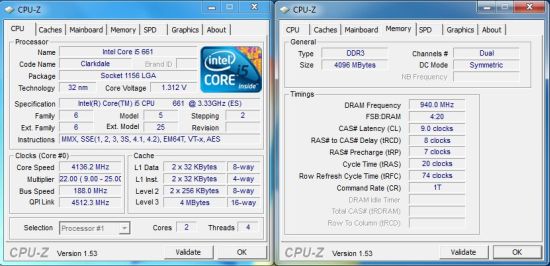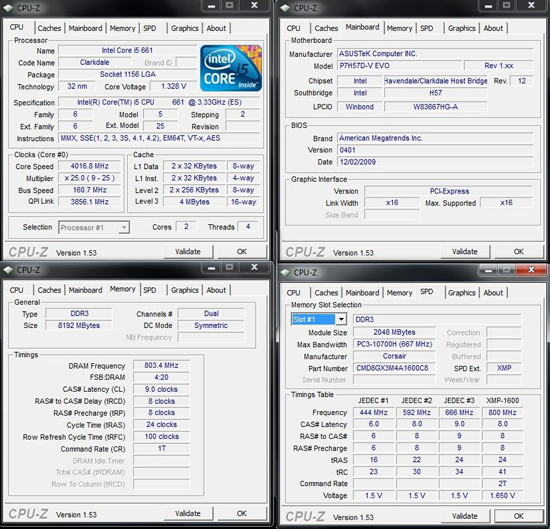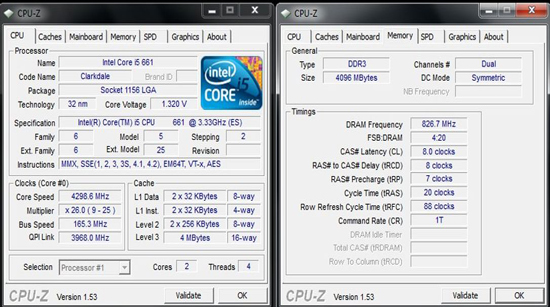Choosing the Best H55/H57 Motherboard - Part 1
by Rajinder Gill on January 31, 2010 11:30 PM EST- Posted in
- Motherboards
Overclocking - Dissent in the Ranks
Ok, let's start off with a discrete GPU. When using 4GB configurations, the best board of the bunch appears to be the ASRock.

It's the only board that manages this speed fully stable with our Corsair Dominator kit. This is surprising considering the ASRock board has the least overclocking centric BIOS of the boards we have on test today. Voltage scales are fairly coarse in stepping, and memory sub-timing options are limited together with control over the QPI multiplier, but this does not seem to affect the board when it comes to 4GB memory configurations using the 2:10 memory ratio, even when using "lesser" performance modules.
The H57 EVO manages to take the same components to around 182 BCLK while the MSI and ASUS H55 models reach their limits at around 175 BCLK - around 130MHz lower than the ASRock board for raw memory frequency.
8GB memory overclocking is a different story. The leader in this department is the most expensive board on test today, the ASUS H57M EVO:

ASUS' H57 offering pips the ASUS H55M EVO to the post with our 8GB Corsair memory kit. The H55 model manages around 1580MHz fully stable vs. 1600MHz stable on the H57.
The ASRock's limits come in around 1450~1500MHz because you don't get access to some of the sub-timings needed to run higher memory speeds fully stable when the DIMM slots are loaded with 8GB, nor do you get the option to lower the QPI multiplier. That lands you at frequencies that the IMC cannot handle when loaded heavily.
MSI's BIOS provides plenty of additional sub-timing options, although we could not find a combination of settings to help achieve what we managed on both of the ASUS boards using the same memory modules. The QPI ratio had to be dropped to accommodate, while memory sub-timings needed loosening to achieve full stability.
One thing worthy of mention here, S3 sleep resume will work on the ASUS H55/H57 EVO boards and the MSI board at 200BCLK and beyond if you use lower memory multiplier ratios and QPI multipliers. The ASRock H55M-Pro is limited to a maximum of 190 BCLK for sucessful S3 resume on current BIOS releases.
Overclocking with the IGP Active
This is where things become limited rather quickly when it comes to maximum stable BCLK frequency. Anything over 165 BCLK needs judicious amounts of IGP voltage to facilitate higher CPU core speeds, even if you don't overclock the IGP in tandem. Using our 661 sample CPU and retaining the stock 900MHz IGP frequency, a BCLK of 165 is possible on all four boards using the 2:10 memory ratio and the highest available QPI multiplier. Anything higher and we have to pump an extra 0.1V into the IGP to get to 175 BCLK.

One would think that using a lower the QPI multiplier and memory ratio would increase headroom somewhat, but it appears this is not the case. We tried all QPI multipliers in conjunction with the 2:8 and 2:6 memory ratios and could not find a combination that was stable enough to enter the OS over 175 BCLK. Whether or not this is down to vendors getting to grips with the platform or not is currently unknown to us, although it would not be surprising if that happens to be the case. Time will tell.
We've run out of time to explore every angle of IGP performance and QPI ratios in this article, but we will endeavor to cover this angle in a future article if need be. Right now, we'll say it appears that you're going to be BCLK limited south of 170 MHz with the IGP in tow. Subtract another 20MHz off that for 8GB configurations, and bear in mind that you'll need to use low memory speeds, capping you to a maximum of around DDR3-1333MHz with things in their current state.










56 Comments
View All Comments
just4U - Wednesday, February 3, 2010 - link
Ever since I read about there being problems on the 1156 boards with certain sockets... I've been leary about buying any 1156 boards. I'd heard reports that it was happening even to those not overclocking and for me that's cause for concern. I look at all the offerings and wonder..Is it fixed? Which boards would be effected? I'd like more info on that before I even consider purchasing the i5/i3 etc. Perhaps Anand can include information on all this in part2 or 3?
Thanks.
Rajinder Gill - Wednesday, February 3, 2010 - link
Hi,There have been no official updates from socket vendors/intel/board vendors as to the exact cause of socket burnouts we experienced on some fo the early 1156 boards. To date, it appears the majority of issues reported have been on boards that were manufactured pre September 2009.
FWIW, all of the sample boards I've had for H55/H57 have arrived with Lotes sockets so far, although I'm not sure if that means vendors are not using Foxconn altogether. We have not seen any issues in testing thus far.
regards
Raja
just4U - Wednesday, February 3, 2010 - link
Yeah that's another thing that keeps me put off. Is I don't know which boards are using the Foxconn. Anyway thanks for the reply back.thaze - Wednesday, February 3, 2010 - link
I just received a Gigabyte GA-H57M-USB3 and an Intel Core i3-530.An interesting feature seemed to be the Dolby Home Theater (i.e. Dolby Digital live encoding). However its software is hard to find, there's no reference in the Gigabyte CD's main menu. I eventually found it at \utility\dolby\. Install went fine but the program is crashing when executed. Maybe someone could confirm the same problem running Win 7 x64.
thaze - Friday, February 5, 2010 - link
"I've forwarded your problem to our HQ, and your problem is duplicated.A solution will be provided by HQ very soon.
Please just wait for my further information later."
Rajinder Gill - Friday, February 5, 2010 - link
Hi Thaze,Gigabyte messed up on this one, their engineers forgot to add the BIOS string to unlock the Dolby features on the H55/H57M-USB3 models. BIOS F3a beta (Jan 8 dated I think) was pulled a couple of days ago from their support page and is due to be replaced with an F4 BIOS fixing the problem.
regards
Raja
thaze - Saturday, February 6, 2010 - link
Thanks again for the details. F4 is out now and I can finally use Dolby Home Theater. :)Rajinder Gill - Wednesday, February 3, 2010 - link
Hi,Just testing the GB boards now, so will get back to you with an answer on this asap. I'm on Win 7 64 bit.
regards
Raja
Rajinder Gill - Wednesday, February 3, 2010 - link
Hi,It appears you are correct. I just installed the Dolby X64 package and when I try to run the software, it crashes.
regards
Raja
thaze - Wednesday, February 3, 2010 - link
Thank you for your reply.I also sent a message to GB support yesterday, will inform about their statement here.